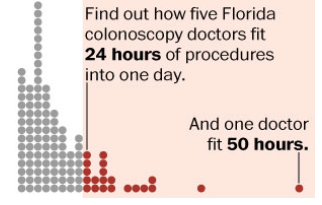Exposing the AMA Secret Payment Panel
The Washington Post did a nice piece showing how the AMA has helped specialists for so long and how they do it in secret. By over exaggerating the time to do a procedure, sometimes by as much as 100 percent, it enable certain specialists to be be paid more. Much more. This from the article:
- To determine how long a procedure takes, the AMA relies on surveys of doctors conducted by the associations representing specialists and primary care physicians. The doctors who fill out the surveys are informed that the reason for the survey is to set pay. Increasingly, the survey estimates have been found so improbable that the AMA has had to significantly lower them, according to federal documents.
- The AMA committee, in conjunction with Medicare, has been seven times as likely to raise estimates of work value than to lower them, according to a Post analysis of federal records for 5,700 procedures. This happened despite productivity and technology advances that should have cut the time required.
- If AMA estimates of time are correct, hundreds of doctors are working improbable hours, according to an analysis of records from surgery centers in Florida and Pennsylvania. In some specialties, more than one in five doctors would have to have been working more than 12 hours on average on a single day — much longer than the 10 hours or so a typical surgery center is open.
The Relative Value Update Committee, or RUC consists of 25 members appointed by medical societies and six others. This is an AMA committee that makes the update recommendations to Medicare. And it is all done in secret.
I am not here to hammer what specialists make. It is interesting, though, that the AMA and the RUC really hasn’t helped primary care much. An ophthalmologist doing “30 to 40 surgeries per day on Mondays and Tuesdays amounts to 30-plus-hour workdays if AMA time estimates are correct. Yet he works about 10.5 hours those days.” It sure seems that the AMA helped that dude. It is always eye-opening to see how easy it can be to game the system. Not that some primary care docs don’t try it but it is much harder and even more unethical.
The RUC is broken. Family docs and internists need to leave the system.










I remember in residency learning about RVUs and the rest of the alphabet soup payment models and thinking, ‘No way I’m getting involved with that BS.’
It’s not a secret panel to anyone that’s been paying attention, this has been an issue for a long time. There have been many discussions on this at Sermo, etc. Often the specialists will say they don’t want this to turn into a primary care vs specialists battle.
Ultimately though is there’s only a finite amount of money to be spent and the AMA made sure the lion’s share of that went to the specialists. As the article says the AMA panel includes representatives from specialty organizations and the result is specialties are over-represented due to primary care. Bottom line is the AMA has screwed over primary care. Individual specialists should not be made accountable for that in my opinion – if anything it shows how useless groups like the AAFP are.
Doug, while I agree with that article, and while I am annoyed that they only mention the way that the current system overpays for procedures at the very end of the article, the article itself is from 2013.
How did you manage to dig it up?
Damn, not sure, but you are right. Articles get sent to me and I choose which to write about but somehow missed this date. Sorry.
Ha ha. I completely understand.
Frankly, I can’t imagine how you have time to do all you do with this blog, and also practice medicine.
How you were able to publish PJ singlehandedly, while working, completely evades me.